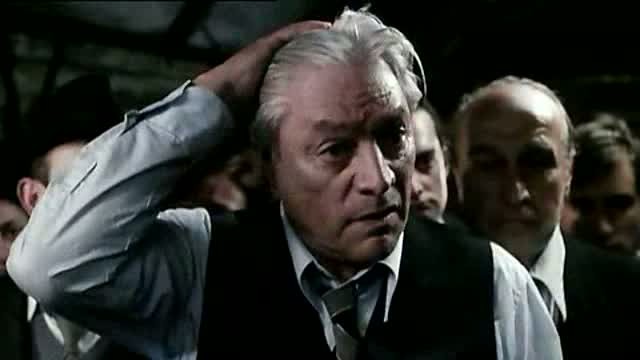Scénario:
Stephen GlantzPhotographie:
Joseph VilsmaierMusique:
Chris HeyneActeurs·trices:
Gedeon Burkhard, Lale Yavas, Lena Beyerling, Sibel Kekilli, Roman Roth, Brigitte Grothum, Hans-Jürgen Silbermann, Sharon Brauner, Juraj Kukura (plus)Résumés(1)
The tragic tale of a Jewish woman sent to the concentration camp in Auschwitz in early 1943. The transport takes over six days and nights with people packed together in a container without any space to move. (texte officiel du distributeur)
Critiques (2)
Le dernier train que j'ai vu était en mars 2008 dans un vieux cinéma rare (le village de Nučice près de Prague, où il y avait des toilettes sèches - des latrines!) Cela a énormément ajouté à l'atmosphère du film et à mon impression positive à son sujet. Il faut apprécier l'intention des créateurs de montrer l'intensité du purgatoire, alors que d'autres cinéastes ne montrent que l'enfer lui-même. Le dernier train, se déroulant entièrement dans un train en direction d'Auschwitz, se termine par l'arrivée en enfer, tandis que le spectateur est déjà tellement horrifié qu'il n'a plus besoin ni envie d'aller plus loin. Au départ, le film semble être le premier film d'un réalisateur naïf de comédies théâtrales, mais il se transforme progressivement en un drame dépressif, se nourrissant de l'atmosphère oppressante et de l'étiquette éprouvée "c'est ainsi que cela s'est réellement passé". Dommage que le film ne parvienne pas à tirer davantage parti des différents personnages.
()
This is one in a long series of films that attempt to convey the horror of the Holocaust to contemporary audiences. However, I certainly didn't feel like I was having an exceptional cinematic experience. Some of the reservations mentioned in the comments have a real basis. The film is a bit rough in places and some scenes look unnatural, and yet the foundation, i.e., the drama of people condemned to death, who are herded into cattle cars and die of thirst in tropical heat, still functions. The incident with the spilled bucket, the small dramas resulting from a lack of personal space, and clinging to futile hopes, are all powerful moments that make the film function decently, and the cast is certainly not bad. The film is most harmed by the fact that it was produced in a German setting and tries to justify the idea that many Germans thought differently and tried to "help and protect" however they could despite the repulsive nature of Nazism. That is why there is a scene where German soldiers returning from the eastern front share their supplies with a Jewish transport and even come into conflict with the guarding SS officers, risking a shootout with their commander. Anyone who has any idea about the intense indoctrination of anti-Semitism that the Wehrmacht was subjected to, the strong tradition of anti-Semitism even before the fascists came to power, the extent to which units in the east were involved in war crimes, the level of identification with the regime that existed in the army, and the draconian punishments for any cooperation with the enemy, can only laugh at such fantasy. Especially when they realize the strict discipline that service in the Wehrmacht demanded and the privileged position that the SS units held. No, not even my fondness for Dana Vávrová will lead me to give it four stars. Overall impression: 65%.
()

